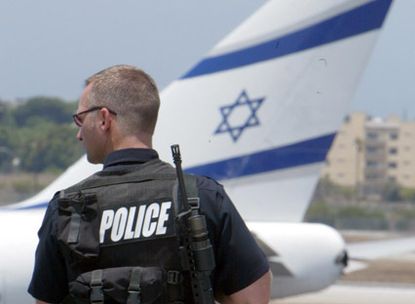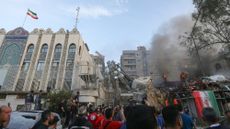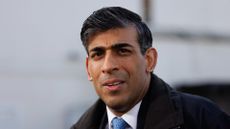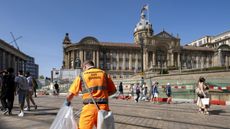Air security: rest of world needs to learn from El Al
From racial profiling to anti-missile shields: the measures Brown should be introducing

In the wake of the international panic caused by the Detroit underpants bomber on Christmas Day, Gordon Brown has come out with a range of new security measures. A 'no-fly' list is to be established, all flights between Britain and Yemen are cancelled forthwith, and terrorist movements will be "seamlessly tracked and disrupted". Finally, the introduction of full body scanners will begin at British airports next week.These measures will no doubt lessen the risk. But do they go far enough?
Potential airline passengers might like to know which national airline was recently named by the magazine Global Traveler as the world's most secure; which airline is so confident of the security procedures at its main hub airport that it still permits passengers to board with bottles and tubes of liquid brought from home; and which airline uses racial profiling. The answer of course is El Al, the Hebrew phrase meaning 'To The Skies', which flew its inaugural flight in September 1948 and since the 1972 massacre at Ben Gurion airport near Tel Aviv in which 26 people were murdered, has suffered no successful attacks. Almost all attempts which did take place were carried out on foreign soil (the 1976 Entebbe hijacking was the work of terrorists who boarded the El Al plane with their weapons during a stopover in Athens.) As a non-Jew who flew it regularly during the 11 years I was based in Jerusalem as a foreign correspondent, I can vouch that this record is all the more impressive and all the more in need of copying by less rigorously guarded airlines in Europe, America and Asia because it is the most theoretically juicy target for Arab and Muslim terrorists anywhere on the globe. Yet, such is the effectiveness of its various deterrents seen and unseen that the actual attempts against its fleet of nearly 40 aircraft on nearly 50 cargo and passenger routes are minimal. In addition to its shameless pro-Jewish racial profiling, which involves widely different treatment for different types of passenger and individual questioning of passengers by Israeli staff (often women) trained in psychological techniques and unafraid to ask the most intrusive details of the passenger's recent movements and intentions, there are also many less obvious precautions that are constantly being modified. Up-to-the-minute specifications of the types of weapons and explosives likely to be employed by suicide bombers and other terrorists is provided by the Israel Defence Force's secretive substance laboratory based in a nondescript cluster of prefabricated huts at the Tel Hashomer army base near Tel Aviv. In addition, all El Al terminals around the world are patrolled by plain-clothes agents and fully armed police or military personnel who check for explosives, suspicious behaviour and other threats. No ticket without a sticker from the security interrogators will be accepted and particular note is taken of how and where it was purchased. At passport control, passengers' names are checked against information from the FBI, Canadian Security Intelligence Service, Scotland Yard, Shin Bet, Interpol and French Deuxieme Bureau data bases. All bags are routinely put through a decompression chamber simulating pressure once airborne that could trigger explosives. Once on board, every El Al flight contains at least two, and often more plain-clothes, armed sky marshals, who sit randomly among the passengers.
All pilots are former Israeli Air Force fliers (their wartime motto in Hebrew, roughly translates as: 'Our best men for the Air Force and the best girls for the pilots') and, since an attempt in 2002 to shoot down an El Al plane, all aircraft are equipped with an Israeli-developed counter-measures system called 'Flight Guard' to defend against anti-aircraft missiles. (This has provoked anger from the Swiss and other European governments who have complained in vain that flares dropped by the Israeli system could ignite fires in the vicinity of their airports.) In line with the thoroughness that governs all aspects of Israel's airline security, all El Al cockpits have double doors to prevent entry by unauthorised people. A code is required to access the doors, and the second door will only be opened after the first has closed, and the person entering has been identified by the Captain or First Officer. Many regular El Al passengers, although critical of some aspects of Israeli policy, are convinced that other countries are going to have to overcome some of their liberal sensitivities and adopt Israeli-style security measures. As Michael Goldberg, president of the New York-based concern IDO Security Inc, which developed a device that can scan shoes while they are still on people's feet, said: "All must look to Israel and learn from them. This is not a post-9/11 thing for them. They have been doing this since 1956, the year of the Suez Crisis." Issy Boim, a former agent for the Israeli equivalent of MI5, Shin Bet, explained that El Al's rigorous security procedures relied heavily on human intelligence. The difference between the Israeli and American systems, he said, is that the Israelis are looking primarily for the terror suspect, while the Americans are looking for weapons. Despite the comprehensive nature of the Israeli security hardware employed by and around El Al - the first armed road block on the approach to Ben Gurion is encountered at least a mile before the main terminal entrance doors - it is the blatant racial profiling that incurs the wrath of human rights campaigners and will probably prevent any exactly similar system being introduced into the United States.
Subscribe to The Week
Escape your echo chamber. Get the facts behind the news, plus analysis from multiple perspectives.

Sign up for The Week's Free Newsletters
From our morning news briefing to a weekly Good News Newsletter, get the best of The Week delivered directly to your inbox.
From our morning news briefing to a weekly Good News Newsletter, get the best of The Week delivered directly to your inbox.
Similarly, the individual passenger interrogations would be problematical in terms of employing and training staff as there are over 400 airports in the US, compared to only half a dozen in Israel. The matter-of-factness with which most Israelis accept racial and religious profiling was outlined in the liberal Tel Aviv daily Haaretz by leading Israeli journalist Anshel Pfeffer, who wrote: "Neither the American administration, nor its counterparts in other Western countries, are willing to contemplate a system in which Muslim citizens will be screened differently from their Christian, Jewish or atheist compatriots. "In Israel, though, there is no question whatsoever. It all happens quite openly. To Israelis, the practice of picking people out based on racial stereotypes is so self-evident, there is not even a Hebrew term for it." In London, Philip Baum, editor of Aviation Security International and managing director of Green Light Limited, an airline security company, argued that the current approach was indeed outdated. Although he added that profiling based on race and religion was counter-productive and should be avoided, he concluded firmly: "Reluctance to distinguish travellers on other grounds such as their general appearance or their mannerisms is not only foolhardy, but dangerous."
Create an account with the same email registered to your subscription to unlock access.
Sign up for Today's Best Articles in your inbox
A free daily email with the biggest news stories of the day – and the best features from TheWeek.com
-
 5 Grand Canyon-size cartoons on the Arizona abortion ruling
5 Grand Canyon-size cartoons on the Arizona abortion rulingCartoons Artists take on a chasm in reproductive freedom, the dangers of an abortion ban, and more
By The Week US Published
-
 Crossword: April 13, 2024
Crossword: April 13, 2024The Week's daily crossword
By The Week Staff Published
-
 Sudoku hard: April 13, 2024
Sudoku hard: April 13, 2024The Week's daily hard sudoku puzzle
By The Week Staff Published
-
 'So much for the triumph over inflation'
'So much for the triumph over inflation'Instant Opinion Opinion, comment and editorials of the day
By Harold Maass, The Week US Published
-
 Iran vows revenge after Israel's consulate strike
Iran vows revenge after Israel's consulate strikeSpeed Read An Israeli strike demolished a consulate in Syria, escalating tensions
By Peter Weber, The Week US Published
-
 Will Aukus pact survive a second Trump presidency?
Will Aukus pact survive a second Trump presidency?Today's Big Question US, UK and Australia seek to expand 'game-changer' defence partnership ahead of Republican's possible return to White House
By Sorcha Bradley, The Week UK Published
-
 It's the economy, Sunak: has 'Rishession' halted Tory fightback?
It's the economy, Sunak: has 'Rishession' halted Tory fightback?Today's Big Question PM's pledge to deliver economic growth is 'in tatters' as stagnation and falling living standards threaten Tory election wipeout
By Harriet Marsden, The Week UK Published
-
 Marwan Barghouti: the Palestinian hostage 'seen as Nelson Mandela'
Marwan Barghouti: the Palestinian hostage 'seen as Nelson Mandela'Why Everyone's Talking About Hamas demands release of popular Fatah leader touted as next Palestinian president
By Elliott Goat, The Week UK Published
-
 Why your local council may be going bust
Why your local council may be going bustThe Explainer Across England, local councils are suffering from grave financial problems
By The Week UK Published
-
 Rishi Sunak and the right-wing press: heading for divorce?
Rishi Sunak and the right-wing press: heading for divorce?Talking Point The Telegraph launches 'assault' on PM just as many Tory MPs are contemplating losing their seats
By Keumars Afifi-Sabet, The Week UK Published
-
 How would a second Trump presidency affect Britain?
How would a second Trump presidency affect Britain?Today's Big Question Re-election of Republican frontrunner could threaten UK security, warns former head of secret service
By Harriet Marsden, The Week UK Published